DGA 2020-2025 Survey and Focus Group (English and Spanish)
Generic Clearance to Conduct Formative Research/CNPP
Attachment E-2 Discussion Guide (English) clean OCIO 081120 (v1)
DGA 2020-2025 Survey and Focus Group (English and Spanish)
OMB: 0584-0523
OMB CONTROL NO.: 0584-0523
EXPIRATION DATE: 11/30/2022
OMB BURDEN STATEMENT: According to the Paperwork Reduction Act of 1995, no persons are required to respond to a collection of information unless it displays a valid OMB control number. The valid OMB control number for this information collection is 0584-0523 and the expiration date is 11/30/2022. The time to complete this information collection is estimated at 2 hours, including 30 minutes for logging into the online platform, reviewing instructions, and completing the information. Send comments regarding this burden estimate or any other aspect of this collection of information, including suggestions for reducing this burden, to: U.S. Department of Agriculture, Food and Nutrition Services, Braddock Metro Center II, 1320 Braddock Place, Alexandria, VA 22314, ATTN: PRA (0584-0523). Do not return the completed form to this address.
Attachment E-2 Discussion Guide (English)
(Remaining Consumer Audiences)
Focus Group Moderator Guide
Target Time ≈ 2 hours (including 30 minutes to log on)
Introduction (10 minutes]
Moderator introduces him/herself
Remind respondents to be in a quiet place
If you need to step away, do so briefly and come back as soon as possible
Anonymity
Rules for participation online (all opinions count, no wrong answers)
Grab a few pieces of paper and a pen or pencil
Introduction – Share your first name, where you live, with whom you live (people, pets, plants, etc.), and something you like to do in your spare time.
Warm-Up & Food Decision-Making in Short-Run and Over Time Discussion (25 minutes)
Thanks again for joining us today. We are going to start by making a list. I am going to give you a word, and I want you to type all of the words and phrases that come to mind when I say that word. We’ll have about 30 seconds to type our words and phrases into the chat box. What are the words and phrases that come to mind when I say, “healthy eating”?
[MODERATOR TO ALLOW UNAIDED RESPONSE]
[GO AROUND SCREEN:] What were the first few words/phrases that came to your mind? Why those?
When, if at all, do you think about healthy eating?
For you?
For members of your family?
How much, if at all, do you think about healthy eating when it comes to the foods you choose to eat or the beverages you drink during a day? [PROBE: more/less likely to do so at different times of the day]
Let’s get specific. Again, in the chat function, type what, if anything, you think about when it comes to healthy eating, when deciding what to eat or drink. If you typically don’t think about it, just type that into the chat box. If you think about only one thing or two things, just write those.
[GO AROUND SCREEN:] What did you type?
Why those? What about those things makes you think about them when making decisions about what you eat and drink?
In my last question, I asked you about when you make decisions about what you eat and what you drink. How much do you really consider healthy eating (or healthy choices) when it comes to what you drink?
When are you more likely to do so?
How important is it to do so? What makes you say that?
Let’s change the question a bit. When you think about your approach to healthy eating, is it something that has pretty much been the same or has it changed over time?
In other words, have there been times in your life when you were more focused on healthy eating than you are now?
[IF YES:] When were those times?
[IF YES:] What about those times made you more focused on healthy eating?
[IF NO:] Why do you think that is?
What word, or term, can we use to describe that change, or what makes people focus more on healthy eating?
[IF TIME:] Have there been times in your life when you were less focused on healthy eating than you are now?
[IF YES:] When were those times?
[IF YES:] What changed? What about those times made you less focused on healthy eating?
[IF NO:] Why do you think that is?
What about the future? If you look ahead, do you think you will be more focused on healthy eating, less focused on healthy eating, or you will pretty much have the same focus you have now? What makes you say that?
Have you ever thought about healthy eating in this way, over the course of your lifetime? How does it make you feel?
How important is it to think about it in this way? What makes you say that?
What comes to mind when I say the phrase, “life stage”? What about “stage of life”?
To what extent, if at all, do you think your “life stage” affects how much you focus on healthy eating? What makes you say that?
Language/Concept Testing (35 minutes)
A. Thanks for that
information. Now, we’re going to look at a few different
sentences, and I want to get your reactions and interpretations of
the information in each sentence.
MODERATOR WILL ROTATE SENTENCES ACROSS GROUPS TO GET REACTIONS, BUT HEALTHY EATING PATTERN IS ALWAYS LAST.
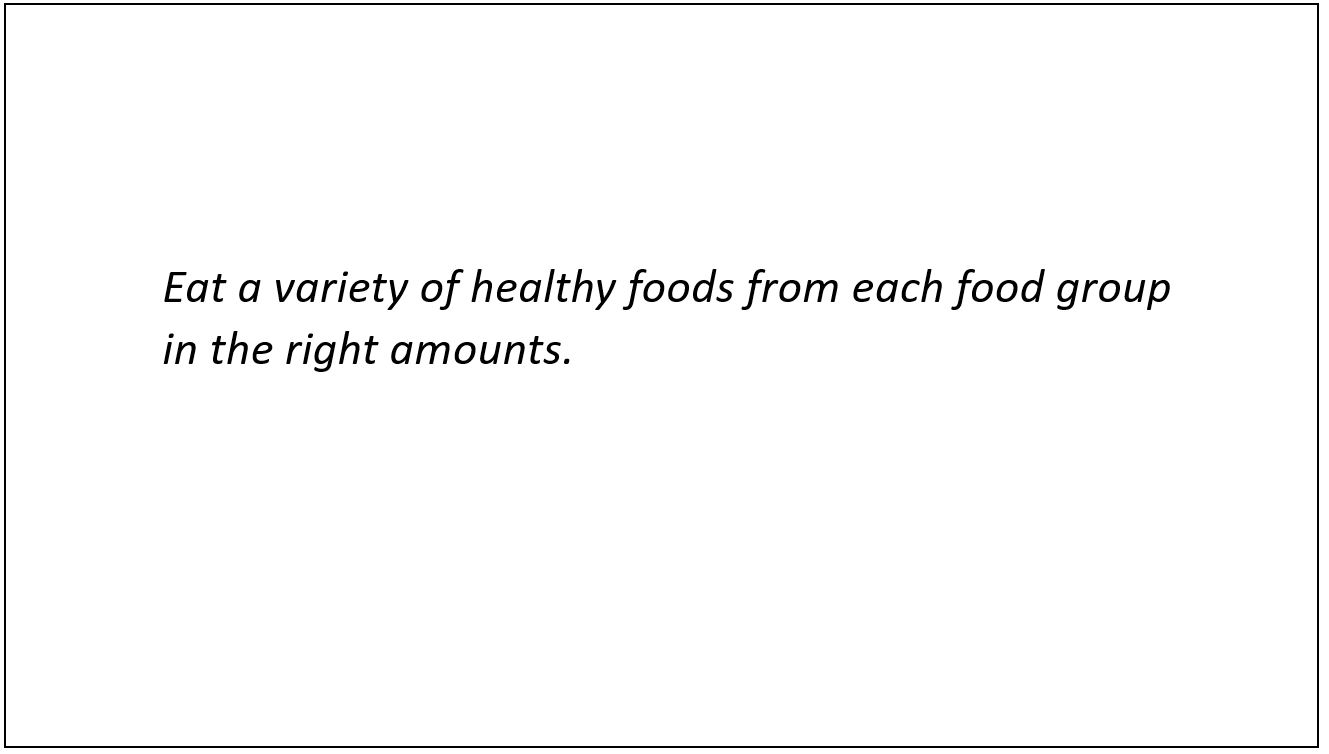
Language displayed on the computer screen during the focus group for participants to read and discuss.
“Eat a variety of healthy foods from each food group in the right amounts.”
What is this sentence asking you to do?
In the chat box, put this sentence in your own words, without using the term, “variety”. MODERATOR REVIEW RESPONSES
Does it seem like it would be easy or hard to do what this sentence suggests?
What makes you say that?
Let’s say you were going to try to do what this sentence suggests. How, if at all, do you think it would change the decisions you make about what to eat and drink?
PROBE: Eating from new food groups
PROBE: Eating more than you normally eat?
What does it mean to eat “the right amounts”?
How do you know if you are eating the right amounts?
This sentence also uses the term, “food groups.”
Are you familiar with the term?
Is it a term you still use?
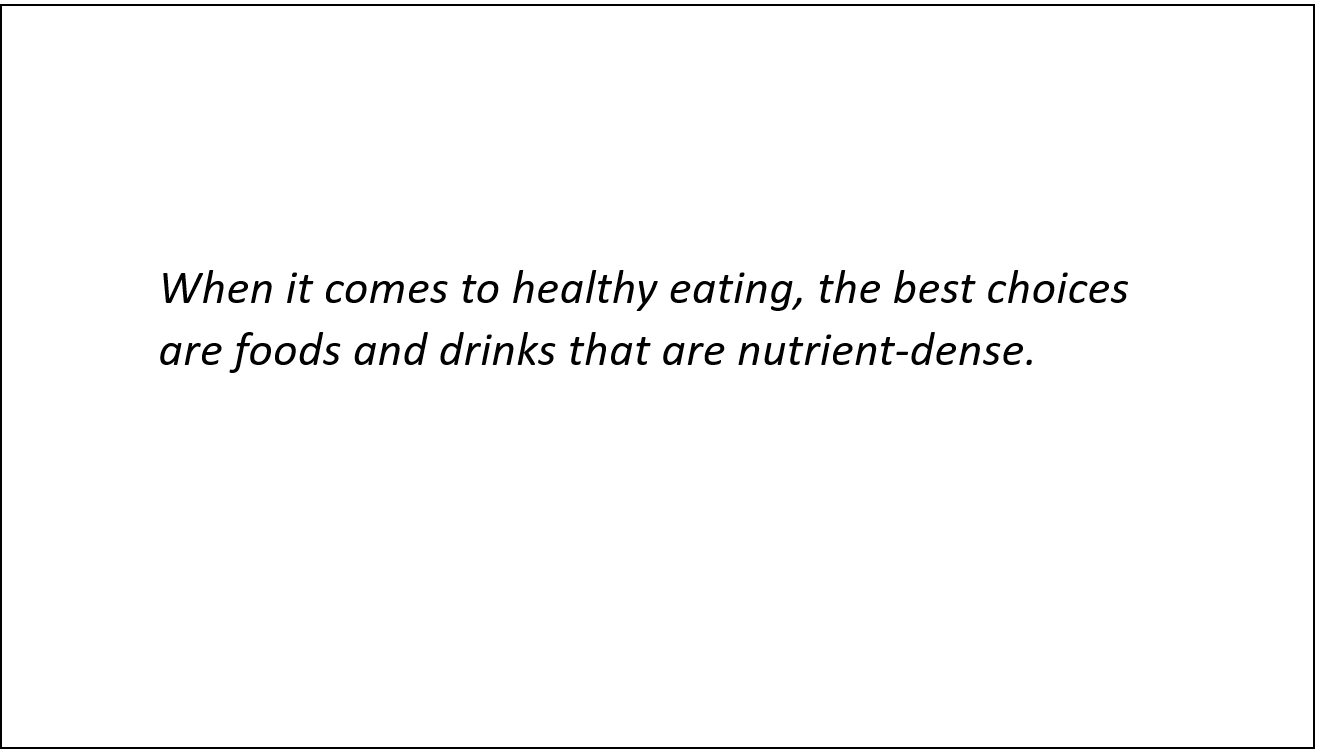
Language displayed on the computer screen during the focus group for participants to read and discuss.
“When it comes to healthy eating, the best choices are foods and drinks that are nutrient-dense.”
What does this sentence mean? How would you rephrase it in your own words?
[IF NOT NOTED IN RESPONSE TO PREVIOUS QUESTION:] What does it mean when a food is “nutrient-dense”?
Is this a good thing or a bad thing?
By a show of hands, how many of you have heard the term, “nutrient density”?
What are some examples of foods or beverages that are nutrient-dense?
How do you know they are?
Does it seem like it would be easy or hard for you to make more nutrient-dense choices when deciding what to eat and drink?
What makes you say that?
How, if at all, do you think it would change the decisions you make about what to eat and drink?
[MODERATOR SHOW POLL ON SCREEN] On the screen, you will see three different phrases that could be used to communicate this idea. Which one would you be most likely to use—nutrient-dense; nutrient-packed; quality calories?
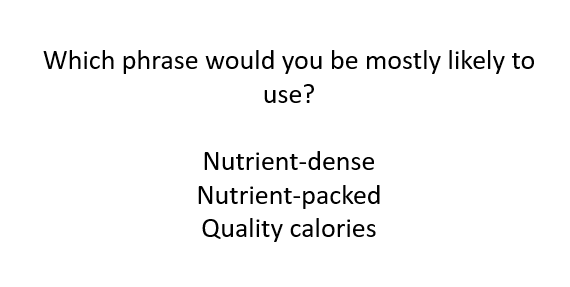
Language displayed on the computer screen during the focus group for participants to read and discuss.
ALLOW RESPONDENTS TO VOTE, SHARE TALLY
Which phrase did you select? What makes you say that?
Is there another term you would use?
Or, do you even need a term? How would you explain this idea with your friends?

Language displayed on the computer screen during the focus group for participants to read and discuss.
“The effects of good nutrition are not from a single meal or snack but rather following a healthy eating pattern over time.”
What does this sentence mean? How would you rephrase it in your own words?
[IF NOT NOTED IN RESPONSE TO PREVIOUS QUESTION:] What is a healthy eating pattern?
A “healthy eating pattern” is supposed to communicate the idea of regularly making healthy food and drink choices. What is your reaction to this idea?
[MODERATOR SHOW POLL ON SCREEN] On the screen, you will see three different phrases that could be used to communicate this idea. Which one does the best job of capturing the idea of regularly making healthy food and drink choices—healthy eating pattern; healthy eating routine; healthy eating habits?
ALLOW RESPONDENTS TO VOTE, SHARE TALLY
Which phrase did you select? What makes you say that?

Language displayed on the computer screen during the focus group for participants to read and discuss.
Does it seem like it would be easy or hard to do what this sentence suggests?
What makes you say that?
Let’s say you were going to try to do what this sentence suggests. How, if at all, do you think it would change the decisions you make about what to eat and drink?
What elements would you have to keep in mind or take into account to make sure you were following a healthy eating pattern?
[IF NECESSARY:] Actually, a healthy eating pattern includes all of the elements we just discussed—variety, selecting foods and beverages that are nutrient-dense, and eating foods in the right amount. What is your initial reaction to this information?
Does this seem doable? Impossible? What makes you say that?
Which of the three do you think is the most important? What makes you say that?
Which of the three would be the easiest for you to do, starting today? What makes you say that?
This sentence also includes the phrase, “over time.”
How does that idea fit into your opinions about healthy eating patterns?
Does it make healthy eating patterns seem easier to do? More difficult? What makes you say that?
Does a healthy eating pattern/routine/habits seem to allow you to be flexible in your choices? What makes you say that?
What about personalization?
Does it seem as though you could personalize your choices in your healthy eating pattern/routine/habits? What makes you say that?
How important is it for you to be able to personalize your choices when it comes to healthy eating? What makes you say that?
Before we move to the next section, I have one more idea to share with you:
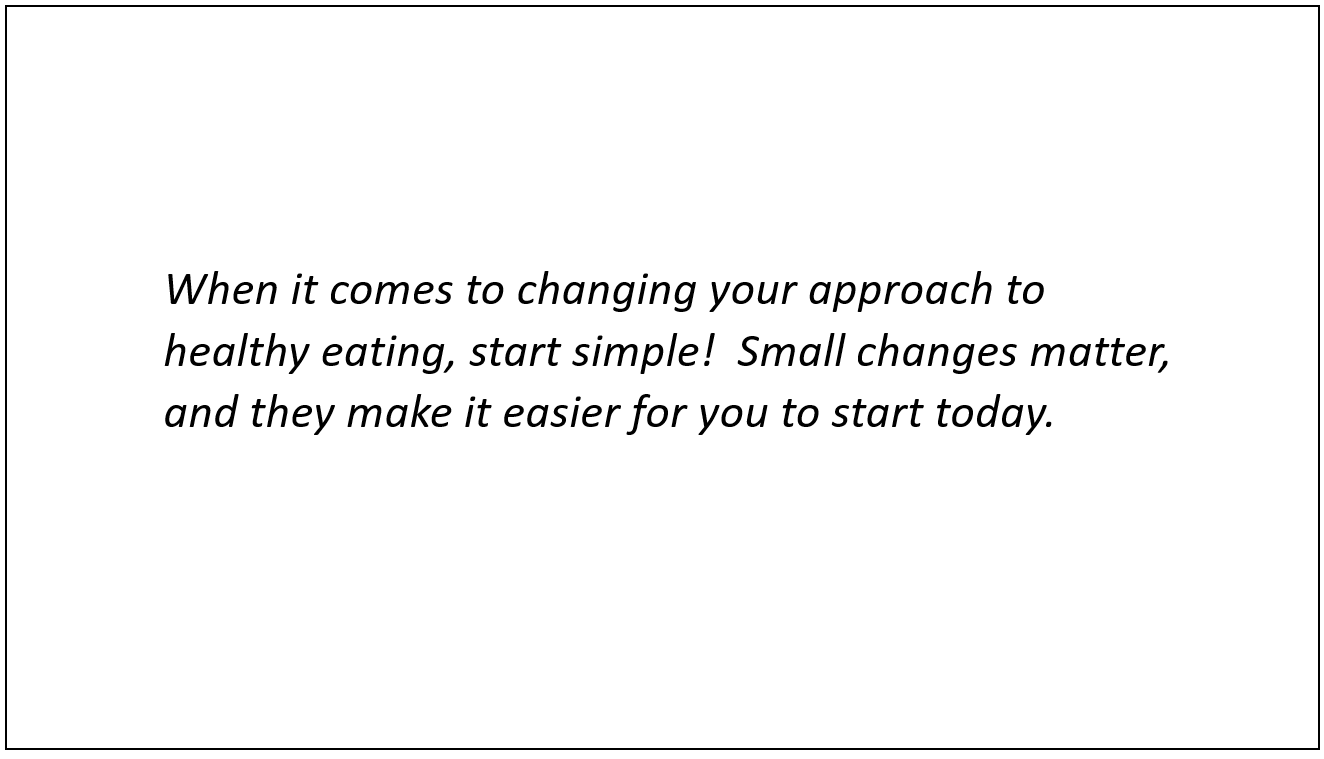
Language displayed on the computer screen during the focus group for participants to read and discuss.
When it comes to changing your approach to healthy eating, start simple! Small changes matter, and they make it easier for you to start today.
What is your reaction to this idea?
Does it seem realistic?
Keeping in mind the three ideas we have been discussing, do you think it is possible to “start simple”?
What assistance/information would you need to help you to “start simple”?
Dietary Guidelines Message Drill-Down (15 minutes)
A. Now we are going to
talk about some specific words and phrases and ideas. I am going to
show them on the screen, and we will talk about a few of them.
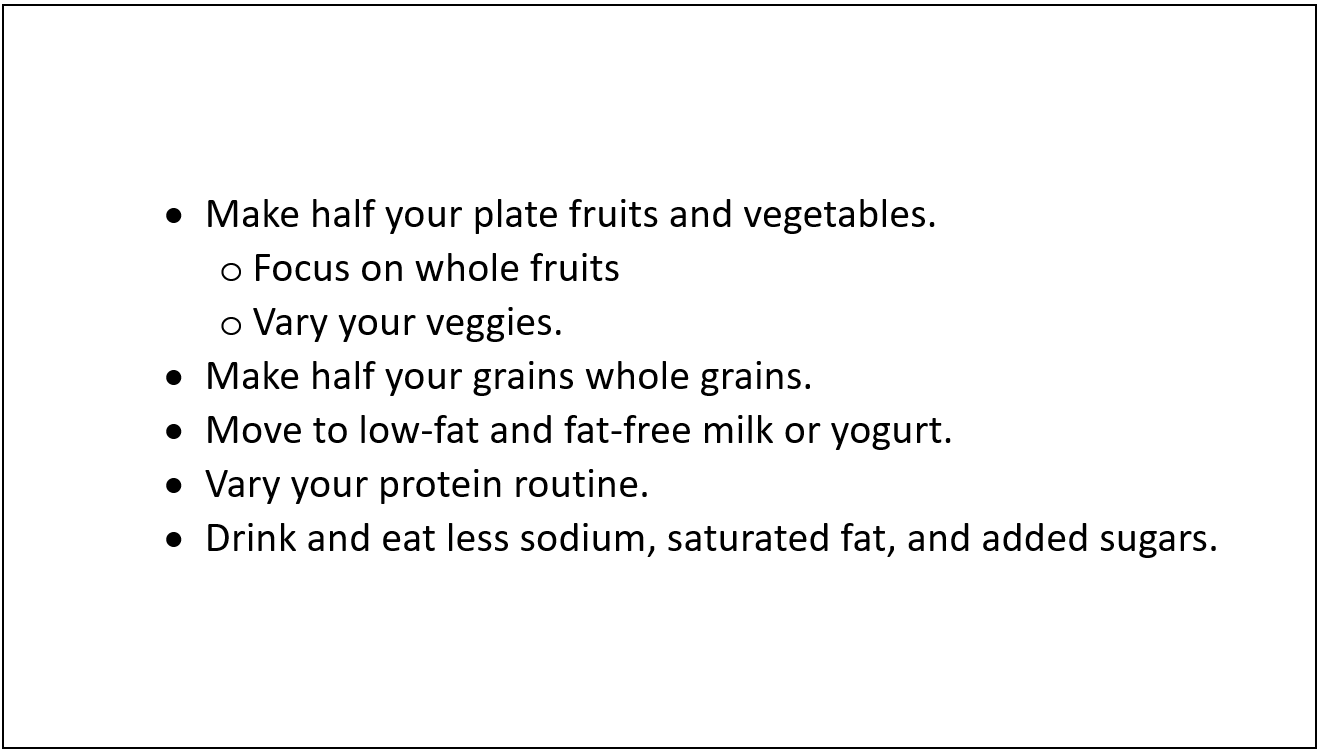
Language displayed on the computer screen during the focus group for participants to read and discuss.
Make half your plate fruits and vegetables.
Focus on whole fruits
Vary your veggies.
Make half your grains whole grains.
Move to low-fat and fat-free milk or yogurt.
Vary your protein routine.
Drink and eat less sodium, saturated fat, and added sugars.
Of the ones that are listed there, which are the most confusing? What makes you say that?
Which one or two would be the hardest for you to do? What makes those challenging?
Which one or two would be the easiest for you to do? What makes those easier for you?
Which of these statements share information you did not know before?
HOLD FOR DRILL-DOWN ON ANY NEW RECOMMENDATIONS FOR CONSUMER AUDIENCES
Wrap-up/False Close (5 minutes)
Thank you for all of the information you have provided. I am going to check with my colleagues to make sure they do not have any additional questions. While I do, please look at the statement on the screen and write an answer in the chat box.
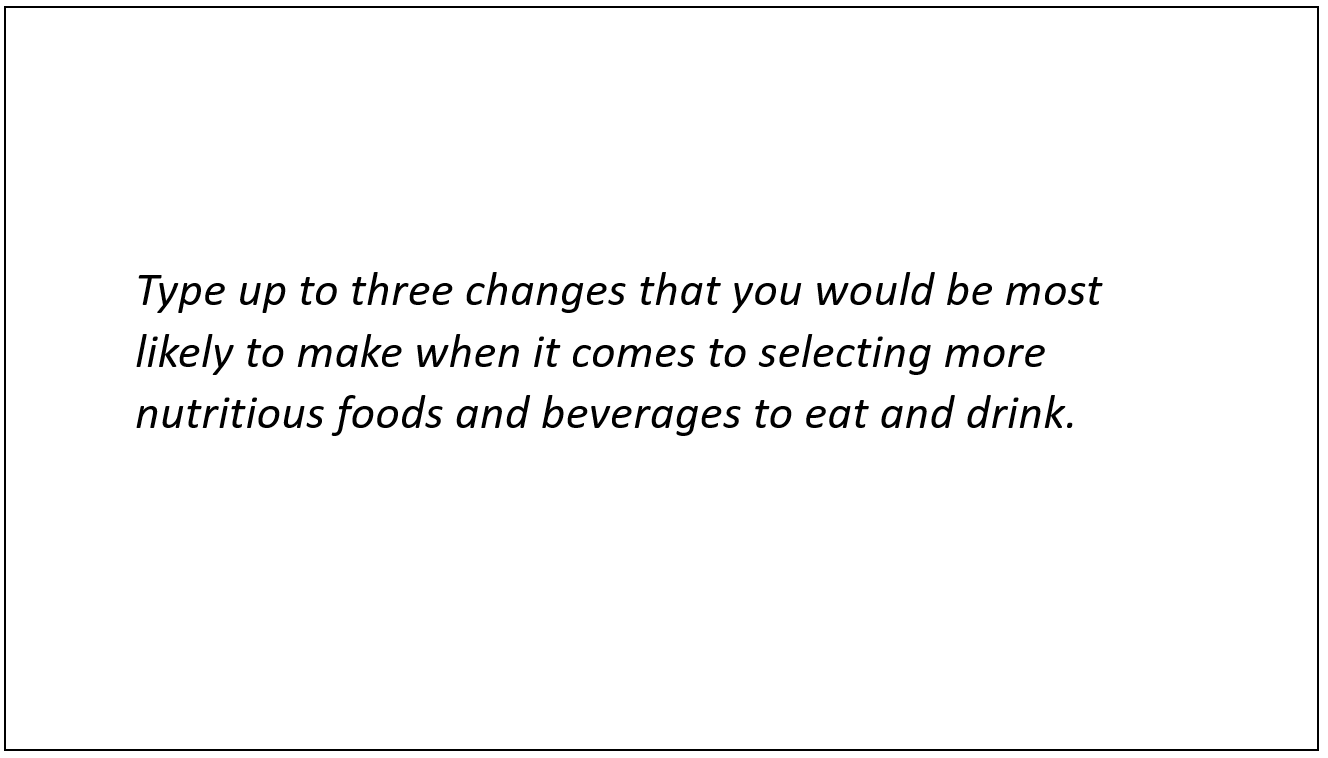
Language
displayed on the computer screen during the focus group for
participants to read and discuss.
Type up to three changes that you would be most likely to make when it comes to selecting more nutritious foods and beverages to eat and drink.
Thanks again! Have a great evening.
Privacy Act Statement:
Legal Authority: The United States Department of Agriculture (USDA) Food and Nutrition Service (FNS) is authorized to collect this information under Section 19 of the Child Nutrition Act of 1966 (42 U.S.C. 1787), Section 5 of the Richard B. Russell National School Lunch Act (42 U.S.C. 1754) and Section 11(f) of the Food and Nutrition Act of 2008 (7 U.S.C.2020).
Purpose: This information will be used in to inform the 2020-2025 Dietary Guidelines for Americans about how Americans make food choices and think about health-related issues.
Routine Use: Information may be disclosed for any routine uses listed in the published System of Record Notice titled FNS-8 USDA/FNS Studies and Reports Federal Register published on April 25, 1991, Volume 56, Number 80, on pages 19078 discusses the terms of protections that will be provided to respondents.; the SORNs can be found at: https://tile.loc.gov/storage-services/service/ll/fedreg/fr056/fr056080/fr056080.pdf.
Disclosure: All information collected will be collected privately and only reported anonymously, without any associated with your information or personal information. Any information which would permit identification of the individual will be safeguarded and will be used only by persons engaged in and for the purpose of the survey, except as otherwise required by law.
Participation in this research is voluntary and there are no penalties for refusing to answer any question. However, your cooperation in obtaining this much needed information is extremely important in order to insure the completeness of the results.
| File Type | application/vnd.openxmlformats-officedocument.wordprocessingml.document |
| Author | Alec Ulasevich |
| File Modified | 0000-00-00 |
| File Created | 2021-01-13 |
© 2026 OMB.report | Privacy Policy